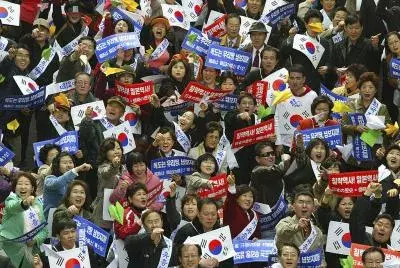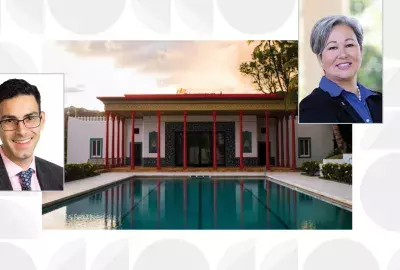Error message

By Rebecca Strating
HONOLULU (24 April 2020)—Many argue that China’s increasingly aggressive posture in the South China Sea is an attempt to unilaterally alter the US-led regional order, which includes an emphasis on freedom of navigation. In response, the US has stressed the importance of support from “like-minded” states—including Japan and South Korea—in defending freedom of navigation in the South China Sea and elsewhere. This characterization, however, disguises important differences in attitudes and behavior that could hinder joint efforts to push back against China.
Differences among allies allow China to disrupt the regional order by ignoring legal rulings and changing the facts on the ground, for example through the construction and occupation of artificial islands. Yet, while both Japan and South Korea have an interest in freedom of navigation in the South China Sea, they do not wish to escalate tensions, raise the risk of great-power conflict, or provoke economic retaliation.
Mixed messages on freedom of navigation
Although Japan and Korea generally support the aims of the US, they are not in full agreement, either with the US or with each other. Because the two countries are simultaneously US allies and trading partners with China, they must tread carefully in both relationships. Seoul and Tokyo also have very different view on important issues, particularly on what rules should govern both commercial and military freedom of navigation.
Both countries broadly defend freedom of navigation—any potential Chinese blockade in the South China Sea would have serious consequences for their economic and energy security. An estimated one-third of all global shipping passes through the South China Sea, including more than 90 percent of Korea’s crude oil imports and 80 percent of Japan’s.
Yet, China is unlikely to disrupt commercial navigation in peacetime, given its own reliance on the South China Sea as a trading route. Military freedom of navigation is a different story.
Disputes in that field tend to involve issues over where warships are permitted to travel under international law, whether they need to give prior notification when travelling through another nation’s territorial waters, and what types of military activities may be undertaken in a coastal state’s Exclusive Economic Zone, which extends 200 nautical miles from the coastline.
Japan’s attitude is tied to a broader concern that the US should retain a strong strategic presence in Asia. Like the US, Tokyo advocates that principles of freedom of navigation should be applied to both commercial and military vessels and that coastal states should be prohibited from requiring prior notification or authorization for foreign warships to exercise continuous and expeditious (“innocent”) passage.
In contrast, Seoul’s official position has largely consisted of vague statements supporting freedom of navigation and the peaceful resolution of disputes through dialogue, but it has attempted to remain neutral on issues concerning the South China Sea. The Korean economy relies on exports, and a quarter of Korea’s exports flow to China. Korea also contends with more significant issues on the Korean peninsula, such as North Korea and efforts at denuclearization, which include a role for China.
Despite statements supporting the US position, Japan has attempted to restrict access to its own coastal jurisdiction on several occasions, including attempts to control navigation through its territorial straits, and Korea requires a three-day prior notification for foreign warships or non-commercial government vessels to cross its territorial waters. In response, the US has conducted Freedom of Navigation Operations (FONOPs)—the passage of military vessels within 12 nautical miles of a coastal state—against both Korea and Japan to protest what it views as excessive maritime claims.
More support for China’s rivals in Southeast Asia
Although US leaders have called upon other nations to join in asserting freedom-of-navigation rights against China, states caught between the two great powers are understandably cautious. Leaders in Japan and Korea tend to view joint naval drills, port visits, training, and maritime security cooperation with Southeast Asian nations—rather than FONOPs—as the best way to uphold freedom of navigation without further destabilizing the region.
Japan’s Self-Defense Forces have provided maritime patrol vessels and planes to Vietnam and the Philippines and have engaged in joint training exercises. Japan’s coast guard has also increased its presence in the South China Sea through port calls, drills, and joint military exercises. Korea exported 12 FA-50 fighter jets to the Philippines and has vowed to enhance cooperation through capacity building, technical cooperation, and knowledge exchange.
Contradictory positions on maritime claims
Japan and Korea are also concerned that any resolution of disputes in the South China Sea could set an unfavorable precedent for their own maritime claims. In the Sea of Japan, the two countries have a long-running contest over the Dokdo/Takeshima “islands”—a set of eight small, uninhabited features that are effectively occupied by Korea. Japan has suggested taking the issue to the International Court of Justice, while Korea, as the effective occupier, has rejected the very basis for seeking an international resolution on the grounds that there is no dispute.
Japan and China are involved in a similar dispute over ownership of the Senkaku/Diaoyu “islands” in the East China Sea, motivated in part by an estimated 50–80-year supply of oil and gas resources in the surrounding seabed. In this case, Japan is the effective occupier and denies that a conflict even exists.
There are similarities between the Dokdo/Takeshima and the Senkaku/Diaoyu disputes, but in the two cases Japan’s position is reversed. This highlights how different attitudes toward dispute-resolution mechanisms depend on how states are positioned: The refusal of effective occupiers to allow international arbitration reflects a desire to avoid losing what they already possess on the ground.
As effective occupiers in some cases and contenders in others, Korea and Japan have both material and ideational motivations that shape their approaches to dispute-resolution mechanisms. Nationalist rhetoric and the domestic political climate make it particularly difficult for states to back down on territorial claims.
Despite these difficulties, it is in Japan’s and Korea’s best interest to support a maritime rules-based order, both in the South China Sea and beyond. To increase the pressure on China to respect international law, both countries should align their own maritime claims more closely with the UN-based Law of the Sea. They should also show respect for international legal mechanisms in resolving their maritime disputes. Such moves are increasingly important as the shifting balance of power dynamics between a rising China and a possibly less-committed US threatens to transform the security order in the region.
###
Download a pdf version of this Wire article.
This East-West Wire is based on Defending the maritime rules-based order: Regional responses to the South China Sea disputes, by Rebecca Strating, Policy Studies 80, Honolulu: East-West Center, 2020.
Rebecca Strating is the acting Executive Director of La Trobe Asia and a Senior Lecturer in Politics and International Relations at La Trobe University in Melbourne, Australia. She can be reached at [email protected].The views expressed do not necessarily reflect the policy or position of the East-West Center or of any other organization.
The East-West Wire is a news, commentary, and analysis service provided by the East-West Center in Honolulu. All or any part of the Wire content may be used by media with attribution to the East-West Center or the person quoted. To receive Wire articles via email, subscribe here. For links to all East-West Center media programs, fellowships and services, see EastWestCenter.org/Journalists.
The full list of East-West Wires produced by the Research Program is available on the East-West Center website at EastWestCenter.org/Research-Wire. For more on the East-West Center Research Program, see EastWestCenter.org/Research.The East-West Center promotes better relations and understanding among the people and nations of the United States, Asia, and the Pacific through cooperative study, research, and dialogue.
Series editors:
Derek Ferrar
[email protected]
Sidney B. Westley
[email protected]
Photo: Crowds in Seoul protest Japan’s claim to the Dokdo/Takeshima islets. Nationalist rhetoric and domestic politics make it difficult for states to back down from territorial claims. Credit: Chung Sung-Jun/Getty Images.
By Rebecca Strating
HONOLULU (24 April 2020)—Many argue that China’s increasingly aggressive posture in the South China Sea is an attempt to unilaterally alter the US-led regional order, which includes an emphasis on freedom of navigation. In response, the US has stressed the importance of support from “like-minded” states—including Japan and South Korea—in defending freedom of navigation in the South China Sea and elsewhere. This characterization, however, disguises important differences in attitudes and behavior that could hinder joint efforts to push back against China.
Differences among allies allow China to disrupt the regional order by ignoring legal rulings and changing the facts on the ground, for example through the construction and occupation of artificial islands. Yet, while both Japan and South Korea have an interest in freedom of navigation in the South China Sea, they do not wish to escalate tensions, raise the risk of great-power conflict, or provoke economic retaliation.
Mixed messages on freedom of navigation
Although Japan and Korea generally support the aims of the US, they are not in full agreement, either with the US or with each other. Because the two countries are simultaneously US allies and trading partners with China, they must tread carefully in both relationships. Seoul and Tokyo also have very different view on important issues, particularly on what rules should govern both commercial and military freedom of navigation.
Both countries broadly defend freedom of navigation—any potential Chinese blockade in the South China Sea would have serious consequences for their economic and energy security. An estimated one-third of all global shipping passes through the South China Sea, including more than 90 percent of Korea’s crude oil imports and 80 percent of Japan’s.
Yet, China is unlikely to disrupt commercial navigation in peacetime, given its own reliance on the South China Sea as a trading route. Military freedom of navigation is a different story.
Disputes in that field tend to involve issues over where warships are permitted to travel under international law, whether they need to give prior notification when travelling through another nation’s territorial waters, and what types of military activities may be undertaken in a coastal state’s Exclusive Economic Zone, which extends 200 nautical miles from the coastline.
Japan’s attitude is tied to a broader concern that the US should retain a strong strategic presence in Asia. Like the US, Tokyo advocates that principles of freedom of navigation should be applied to both commercial and military vessels and that coastal states should be prohibited from requiring prior notification or authorization for foreign warships to exercise continuous and expeditious (“innocent”) passage.
In contrast, Seoul’s official position has largely consisted of vague statements supporting freedom of navigation and the peaceful resolution of disputes through dialogue, but it has attempted to remain neutral on issues concerning the South China Sea. The Korean economy relies on exports, and a quarter of Korea’s exports flow to China. Korea also contends with more significant issues on the Korean peninsula, such as North Korea and efforts at denuclearization, which include a role for China.
Despite statements supporting the US position, Japan has attempted to restrict access to its own coastal jurisdiction on several occasions, including attempts to control navigation through its territorial straits, and Korea requires a three-day prior notification for foreign warships or non-commercial government vessels to cross its territorial waters. In response, the US has conducted Freedom of Navigation Operations (FONOPs)—the passage of military vessels within 12 nautical miles of a coastal state—against both Korea and Japan to protest what it views as excessive maritime claims.
More support for China’s rivals in Southeast Asia
Although US leaders have called upon other nations to join in asserting freedom-of-navigation rights against China, states caught between the two great powers are understandably cautious. Leaders in Japan and Korea tend to view joint naval drills, port visits, training, and maritime security cooperation with Southeast Asian nations—rather than FONOPs—as the best way to uphold freedom of navigation without further destabilizing the region.
Japan’s Self-Defense Forces have provided maritime patrol vessels and planes to Vietnam and the Philippines and have engaged in joint training exercises. Japan’s coast guard has also increased its presence in the South China Sea through port calls, drills, and joint military exercises. Korea exported 12 FA-50 fighter jets to the Philippines and has vowed to enhance cooperation through capacity building, technical cooperation, and knowledge exchange.
Contradictory positions on maritime claims
Japan and Korea are also concerned that any resolution of disputes in the South China Sea could set an unfavorable precedent for their own maritime claims. In the Sea of Japan, the two countries have a long-running contest over the Dokdo/Takeshima “islands”—a set of eight small, uninhabited features that are effectively occupied by Korea. Japan has suggested taking the issue to the International Court of Justice, while Korea, as the effective occupier, has rejected the very basis for seeking an international resolution on the grounds that there is no dispute.
Japan and China are involved in a similar dispute over ownership of the Senkaku/Diaoyu “islands” in the East China Sea, motivated in part by an estimated 50–80-year supply of oil and gas resources in the surrounding seabed. In this case, Japan is the effective occupier and denies that a conflict even exists.
There are similarities between the Dokdo/Takeshima and the Senkaku/Diaoyu disputes, but in the two cases Japan’s position is reversed. This highlights how different attitudes toward dispute-resolution mechanisms depend on how states are positioned: The refusal of effective occupiers to allow international arbitration reflects a desire to avoid losing what they already possess on the ground.
As effective occupiers in some cases and contenders in others, Korea and Japan have both material and ideational motivations that shape their approaches to dispute-resolution mechanisms. Nationalist rhetoric and the domestic political climate make it particularly difficult for states to back down on territorial claims.
Despite these difficulties, it is in Japan’s and Korea’s best interest to support a maritime rules-based order, both in the South China Sea and beyond. To increase the pressure on China to respect international law, both countries should align their own maritime claims more closely with the UN-based Law of the Sea. They should also show respect for international legal mechanisms in resolving their maritime disputes. Such moves are increasingly important as the shifting balance of power dynamics between a rising China and a possibly less-committed US threatens to transform the security order in the region.
###
Download a pdf version of this Wire article.
This East-West Wire is based on Defending the maritime rules-based order: Regional responses to the South China Sea disputes, by Rebecca Strating, Policy Studies 80, Honolulu: East-West Center, 2020.
Rebecca Strating is the acting Executive Director of La Trobe Asia and a Senior Lecturer in Politics and International Relations at La Trobe University in Melbourne, Australia. She can be reached at [email protected].The views expressed do not necessarily reflect the policy or position of the East-West Center or of any other organization.
The East-West Wire is a news, commentary, and analysis service provided by the East-West Center in Honolulu. All or any part of the Wire content may be used by media with attribution to the East-West Center or the person quoted. To receive Wire articles via email, subscribe here. For links to all East-West Center media programs, fellowships and services, see EastWestCenter.org/Journalists.
The full list of East-West Wires produced by the Research Program is available on the East-West Center website at EastWestCenter.org/Research-Wire. For more on the East-West Center Research Program, see EastWestCenter.org/Research.The East-West Center promotes better relations and understanding among the people and nations of the United States, Asia, and the Pacific through cooperative study, research, and dialogue.
Series editors:
Derek Ferrar
[email protected]
Sidney B. Westley
[email protected]
Photo: Crowds in Seoul protest Japan’s claim to the Dokdo/Takeshima islets. Nationalist rhetoric and domestic politics make it difficult for states to back down from territorial claims. Credit: Chung Sung-Jun/Getty Images.
East-West Wire
News, Commentary, and Analysis
The East-West Wire is a news, commentary, and analysis service provided by the East-West Center in Honolulu. Any part or all of the Wire content may be used by media with attribution to the East-West Center or the person quoted. To receive East-West Center Wire media releases via email, subscribe here.
For links to all East-West Center media programs, fellowships and services, see www.eastwestcenter.org/journalists.







